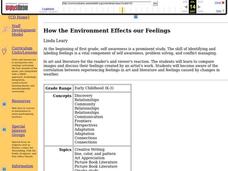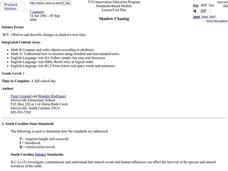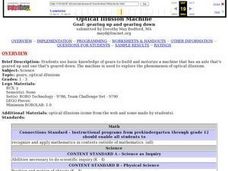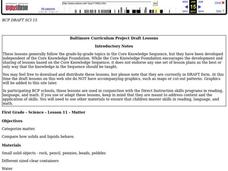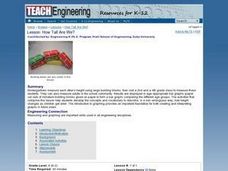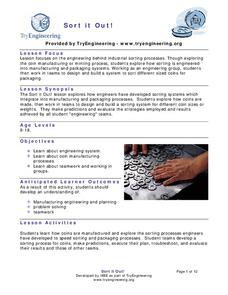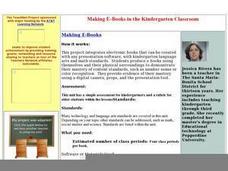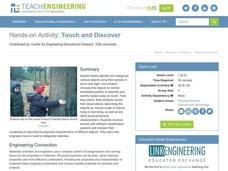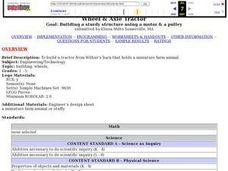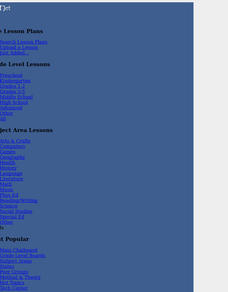Curated OER
H2O in Us
Students discover through this activity that all organisms are composed of water. They find that 70 percent of their bodies are made up of water that is in thier cells and blood, and not free-flowing throughout their body.
Curated OER
DAY AND NIGHT
Students use a lamp as the sun and his/her body as the earth. They rotate in different directions to explain how the earth moves around the sun. Using specific questions in their discussion, students discover the reasons for day and night.
Curated OER
How the Environment Effects our Feelings
First graders compare images and discuss their feelings created by an artist's work. They explore the correlation between experiencing feelings in art and literature and feelings caused by changes in weather.
Curated OER
Shadow Chasing
First graders observe and measure their shadows. They go outside at three hour increments during the course of a day. Each time students measure and record the length of their shadows. Students read books about shadows and discuss why...
Curated OER
The Nature of Mathematics
Young scholars work in groups to describe plants using numbers. In this number lesson, students use numbers to define plants and then use numbers to write descriptions of themselves.
Curated OER
Optical Illusion Machine
Students explore optical illusions. Using Legos, they construct and motorize a machine that has an axle that's geared up and geared down, complete a worksheet, and answer discussion questions.
Curated OER
Rubber Gardens
Students recycle discarded automobile tires and create gardening sites for limited space areas.
Curated OER
A Worm World
Young scholars maintain a compost bin and build a worm observatory. They design experiments relating to worms and record observations in a worm journal.
Curated OER
How Tall Are We?
Students in a Kindergarten class measure each other's height using large building blocks and then visit a 2nd and a 4th grade class to measure those students. They display the results in bar graphs, comparing the different age groups.
Curated OER
Sort It Out
Students study classification systems by sorting Legos and determining how the different pieces are classified. They list as many attributes as possible to use for sorting.
Curated OER
Spiders
First graders complete a variety of center activities to study spider characteristics and facts. They solve math problems, identify spider body parts, and study vocabulary words to use in creative writing about spiders.
Curated OER
Making E-Books in the Kindergarten Classroom
Students produce e-books using themselves and their physical surroundings to demonstrate content standards, such as number sense or color recognition. They provide evidence using a digital camera, props, and the presentation tool.
Curated OER
Dinosaurs - Creatures Of The Past
Pupils use the Internet to search for dinosaurs, then distinguish between meat-eating and plant-eating dinosaurs. They explore theories about the extinction of dinosaurs and create illustrations of dinosaurs using Kid Pix or other...
Curated OER
Rockets on a Shoestring Budgut
Students work together to create rockets on a budget. They discover the limitations that real engineers face when designing and testing their products. They discuss their findings to complete the lesson.
Curated OER
Touch and Discover
Students work together to identify and categorize objects. They have to identify the object on touch because they are blindfolded. They record their data and describe the objects once they can look at them.
Curated OER
Wheel & Axle Tractor
Students design and build a tractor using LEGO materials. They write and draw their designs.
Curated OER
Building A Sturdy Car
Students build a sturdy Lego car using a motor and a pulley. They determine how sturdy the car is by dropping it from the height of the teacher's knee.
Curated OER
It Counts
Students understand and reinforce how numbers are assigned to objects, as well as think about more, less, or equal values. In this lesson, students are asked to describe, compare, and classify plants. They should be able to use numbers...
Curated OER
How big is a whale
Students research the size of whales using print books or the internet. Students do the research in groups. They compare and graph the results.
Curated OER
Weather -- Snowmen in May
Young scholars are read the story "Snowballs" and discuss what the conditions must be for it to snow. They make snowmen out of snow when it snows outside. They discover what happens to their snowmen when they take them inside.
Curated OER
Sink or Float?
Students predict and explore to discover which objects sink or float in fresh and salt water, predict how salt affect objects, write predictions on T chart, discuss difference between man-made and natural waters, and graph results.
Curated OER
Adaptable Mandibles
Young scholars define adaptation and highlight example of adaptation in birds and other animals. They study feeding techniques of seabirds and investigate the effect that trash has on wildlife.
Curated OER
Away You Go
Students build Lego cars which have two different types of tire surfaces. They roll them down ramps that have both rough and smooth surfaces to determine how friction affects the car as it rolls.
Other popular searches
- Math and Science Careers
- Integrated Math and Science
- Science and Math
- Science/ Math Games
- Math and Science Activities
- Integrating Math and Science
- +Math and Science Careers
- Math and Science Plan
- Math and Science Lessons
- Word Origins Science Math
- Math in Science Experiments
- Science Math


